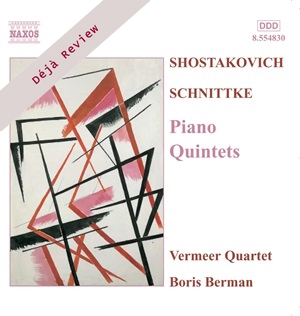
Déjà Review: this review was first published in December 2002 and the recording is still available.
Dmitri Shostakovich (1906-1975)
Quintet for Piano and Strings, Op 57 (1940)
Alfred Schnittke (1934-1998)
Quintet for Piano and String Quartet (1972-75)
The Vermeer Quartet, Boris Berman (piano)
rec. 2000, Glenn Gould Studio, CBC, Toronto. DDD
Naxos 8.554830 [56]
Shostakovich and Schnittke shared the distinction and challenge of being leading Soviet composers. Although a generation or so apart, both became famous not only for their music, but for the trials and tribulations of being original, creative minds under a totalitarian regime which revered or reviled them as the need arose. In spite of these hardships, both men have left a permanent mark on the musical world, and we are all the richer for their determination.
The Vermeer Quartet and pianist Boris Berman give us tour de force performances of chamber music considered to be high points in the output of each composer. Shostakovich’s piano quintet, from 1940, was a turning point for the composer, whose sixth symphony had been met with a less than stellar reception the year before. Written for the Beethoven Quartet and Shostakovich himself, it was programmed often until ill health forced the composer/pianist to drastically curtail his performing career. Cast in five movements, this is a beautiful, lyrical work, full of melodic invention and finesse. Although it is not short on technical challenges, this music was not designed as a show of virtuosity. If one had to describe the piece in a single word, perhaps thoughtful would be the best choice.
Schnittke’s work is quite a contrast to the lyricism expressed by the older Russian. At times very dense and dissonant, at others sparse and melancholy, this quintet is also not without its own moments of sheer beauty. The seamless flow of movements sets up a number of musical conflicts that are resolved in the pastorale finale. The piano’s lilting melody is set against a wash of string sound, whose slow harmonic changes and lack of definable rhythmic gestures give the tune a detached and dreamy quality. At the end, the strings drop out, leaving the piano alone to fade away into the silent distance. This is most effective writing, leaving the listener almost breathless as the music disappears.
These are magnificent performances. The sense of balance and ensemble here is near perfect. Particularly pleasing is the ability of these musicians to recognize when their individual lines are important and when in turn to get out of the way of a colleague. These traits are particularly notable in the Prelude and Fugue of the Shostakovich work. Throughout the entire program, we are riveted by the group’s phenomenal ability to catch our ear with an interesting phrase, and then hand us off to a cohort for something equally fascinating. It takes mere seconds for the listener to realize that he is in for a great ride as one lovely turn of phrase cascades into another. This is music-making of the first order, and repertoire worthy of inclusion in the canon of masterworks of the genre.
Despite the splendid performances, I would be remiss were I not to point out two flaws. First is the annoying and pretentious habit of the Vermeer players to sniff and snort at the beginnings of phrases. This is something that I find maddening. Stringed instruments do not require wind to make them play, and it should go without saying that an ensemble of this quality can be expected to execute a beautiful phrase. We can hear by the playing that the musicians are “breathing” with the phrases to make a singing line. The snorts only make me want to hand out tissues and antihistamines.
The second problem is the program note, which is a syntactical nightmare. The frequent omission of definite articles (the melody appears “on piano”) and the tedious blow-by-blow description of the music, itself ripe with useless multi-syllabic words, further encourages the reader to wait for the movie.
In spite of these little bumps in the road, this is a disc that all lovers of great chamber music should own. Once again, Naxos proves that quality and high price are not synonymous. Recorded sound is superb. Recommended without reservation.
Kevin Sutton
See also review by Hubert Culot
Buying this recording via a link below generates revenue for MWI and helps us keep free access to the site



The Vermeer Quartet:
Shmuel Ashkenasi (violin)
Mathias Tacke (violin)
Richard Young (viola)
Mark Johnson (cello)

















